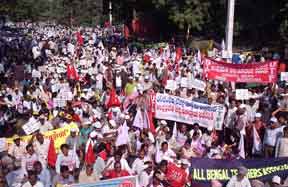 People's Democracy
People's Democracy
(Weekly
Organ of the Communist Party of India (Marxist)
No. 49
December 03, 2006
(Weekly
Organ of the Communist Party of India (Marxist)
|
Vol.
XXX
No. 49 December 03, 2006 |
Massive ‘March To Parliament’ By School Teachers

THOUSANDS of school teachers from all over the country marched to parliament on November 22, 2006 under the banner of School Teachers' Federation of India (STFI). All along the route, from Ramlila Maidan in New Delhi to Jantar Mantar on parliament street, the teachers carrying placards raised slogans against privatisation of pension, foreign direct investment in education, autonomous status to colleges, private universities, contract appointment of teachers, etc.
STFI is the strongest school teachers' movement in the country having units in 21 states and a membership of more than 20 lakh teachers. Since its inception STFI has been vigorously campaigning for right to free and compulsory education to all up to the age of 14 years. Through this march the school teachers demanded enactment of Right to Education Act with necessary amendments to ensure free and compulsory education to all, spending at least 6 per cent of the GDP on education, regulating private self-financing educational institutions and stopping commercialisation of education. They also demanded enactment of right to strike for employees and teachers, rise in GPF interest rate and setting up of a National Commission on Education to review the entire system of education.
At Jantar Mantar (near parliament house), the teachers were addressed by Sitaram Yechury, Polit Bureau member of CPI(M) and MP, Basudev Acharya, CPI(M) leader in Lok Sabha, M Babu Rao, CPI(M) MP, K Rajendran, general secretary, STFI and A K Chandran, joint general secretary, STFI. Earlier, STFI president Kartik Mandal had flagged off the March at Ramlila Maidan.
On November 23, the STFI leaders K Rajendran and N Narayana accompanied by Sitaram Yechury met the prime minister Dr Manmohan Singh and submitted a memorandum. These leaders expressed their protest over central government shifting the task of free and compulsory education to the state governments. It was pointed out to the prime minister that the commercialisation of higher education was also posing formidable challeges to the weaker sections of the society. They further informed that they have decided to go on a nationwide strike on December 14 along with other sections of the working class.
The prime minister assured the delegation that he would look into the demands and speak to the HRD minister about the same.
The memorandum included the following 19 demands for immediate consideration by the central government:
1. Universalise and ensure implementation of the right to early child care and education. Upgrade existing aganwadis and set up similar structures wherever they do not exist. Link aganwadis with school system. Ensure free and compulsory education upto 14 years and abolish child labour in all its forms.
2. Strive for common school system. Ensure at least one state funded school within prescribed kilometre radius, with mother tongue as medium of instruction. Only recognised schools should be allowed. Recognition should be granted on the basis of Constitutional principles of secularism, democracy, equality, social justice and scientific temper. Keeping these principles in view, the Right to Education Bill, 2005 should be amended.
3. Education cess should be spent fully on state funded school education. Spend at least 6 per cent of the GDP on education.
4. Integrate vocational proficiency and practical skills within the curriculum so as to develop work culture and employability.
5. No self-financing courses in State-funded higher educational institutions. More State-funded institutions with adequate infrastructure with liberal freeships and scholarships. Introduce courses in new and emerging areas in State-funded institutions. Expand State-funded technical and professional education. Provide adequate funds for research to respond to social needs and to defend independent and critical thinking.
6. No foreign direct investment in education.
7. Enact central/state law to regulate fees, admission with reservations, curriculum, infrastructural facilities, and salary and service conditions of staff of all unaided institutions including minority unaided institutions.
8. Autonomous status should not be imposed on colleges.
9. No private universities. Existing private universities should seek affiliation as colleges. Scrap the deemed university status granted to private institutions. Bring back the earlier criteria for granting deemed university status. Scrutinise all the deemed universities started in the last 4-5 years on the basis of earlier criteria.
10. No privatisation and commercialisation of education. Education should not be brought under GATS. Initial offers made by the government of India should be withdrawn.
11. Appoint regular teachers and non-teaching staff. Abolish contract system.
12. No differential fee structure and no hike in fees in State-funded institutions. Ensure quality through greater state funding. Decrease the rate of interest on bank loans and provide bank loans without collateral.
13. Democratise the entire system of education. Elections should be held for student unions, teachers’ and non-teaching staff associations. Ensure elected representation of students, teaching and non-teaching staff in decision-making bodies.
14. Funding should not be linked to assessment and accreditation. Assessment should be transparent, democratic and participatory. It should be conducted state-wise by state agencies.
15. Strengthen academic relevance and credibility of education at all levels in accordance with the goals of national development.
16. Enact the right to strike for employees and teachers.
17. Withdraw Pension Fund Regulatory and Development Authority Bill.
18. Raise GPF interest rates.
19. Setting up of a National Commission on Education to review the entire system of education.
STFI leaders who had led the march included Sibaprasad Mukhopadhyay (ABTA), Pradip Biswas (ABPTA), West Bengal, N Narayana (AP), John Philip (Kerala), St Antony Samay, A Mayavan, S Subramanian (Tamilnadu), Sultan Singh Ola (Rajasthan), Sucha Singh Ajnala (Punjab), Satyapal Siwach (Haryana), Amal Chatterjee (Tripura), Narayan Rudrapal (Tripura), R Jayaraman (Pondichery), Rama Devi (Karnataka), Vijay Katam (Maharashtra), Prasana Mishra (Orissa), and Bansari Dass Sharma (J&K). (INN)